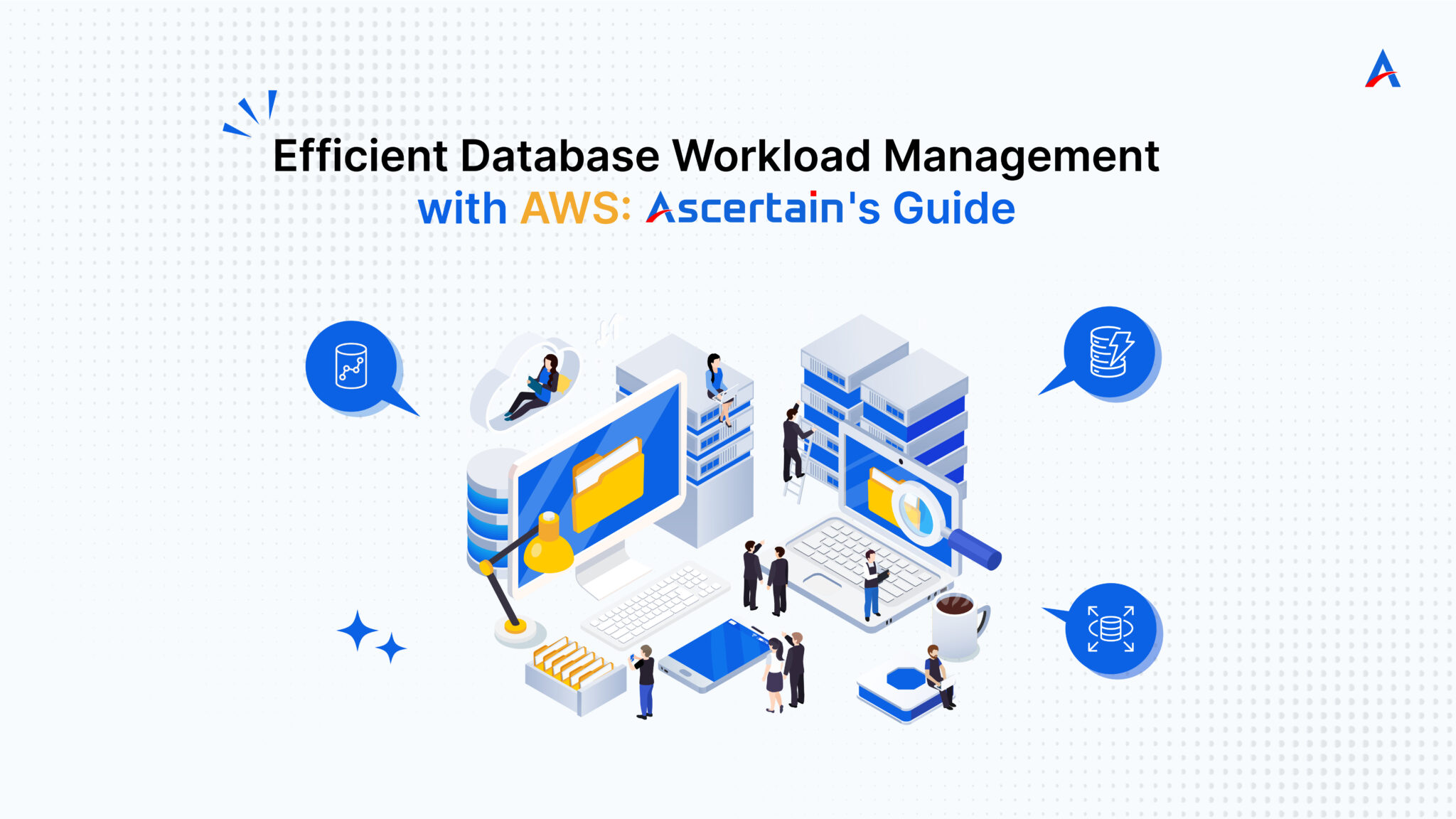From Application to Repayment Ascertain’s Cloud-Based Lending Platform
In today’s data-driven world, managing database workloads efficiently is paramount for businesses of all sizes. The ability to handle increasing data volumes, complex queries, and demanding performance requirements is crucial for success. Ascertain Technologies with Amazon Web Services (AWS) offers a robust suite of database services that can help you optimize your workload management and achieve optimal performance.
As per Gartner, AWS is the leading cloud platform for database services, with a market share of over 30%. The migration of databases to the cloud is accelerating due to its scalability, cost-efficiency, and security benefits.
Understanding Your Unique Database Needs with Ascertain
Understanding Your Unique Database Needs with Ascertain
The first step in efficient database workload management is to thoroughly understand your specific needs. At Ascertain, we believe that a one-size-fits-all approach is rarely effective. That’s why we take a tailored approach to assess your unique needs. Consider the following factors:
- Workload Characteristics: Determine whether your workload is primarily transactional (OLTP), analytical (OLAP), or a hybrid of both. This will help you choose the appropriate database service.
- Data Volume and Growth: Assess your current data volume and project future growth to determine the required storage capacity and compute resources.
- Performance Requirements: Define your performance expectations in terms of response time, throughput, and concurrency.
- Scalability Needs: Consider how your workload will grow over time and whether you need to scale your database infrastructure up or out.
- High Availability and Disaster Recovery: Evaluate the criticality of your data and applications and determine the required level of availability and disaster recovery capabilities.
A study by Flexera found that cloud spending is growing rapidly, with an average of 22% overspending. Optimizing database workloads is crucial for controlling costs.
Selecting the Right AWS Database Service
Selecting the Right AWS Database Service
AWS offers a variety of database services to cater to different workload requirements. Here are some key considerations:
- Amazon RDS: For relational databases, Amazon RDS provides managed instances of popular engines like MySQL, PostgreSQL, SQL Server, and Oracle. It simplifies database administration and offers features like automatic backups, scaling, and high availability.
- Amazon DynamoDB: For NoSQL workloads with high write throughput and low latency requirements, Amazon DynamoDB is a fully managed key-value store that provides automatic scaling and high availability.
- Amazon Redshift: This fully managed, petabyte-scale data warehouse service is optimized for complex analytics and business intelligence workloads.
Ascertain can help you navigate this landscape and select the ideal database service for your specific needs. Our experts will assess your workload requirements and recommend the best-fit solution, ensuring optimal performance and cost-efficiency.
According to IDC, the global datasphere will grow from 46.6 zettabytes in 2021 to 175 zettabytes by 2025. This exponential growth underscores the need for efficient database management solutions.
How Ascertain Optimizes Database Performance
How Ascertain Optimizes Database Performance
Once you’ve selected the appropriate database service, optimizing performance is crucial. Ascertain’s expert team employs a comprehensive approach focus on optimizing performance through the following best practices:
- Database Design: Ensure your database schema is well-normalized, indexed appropriately, and optimized for query performance.
- Query Optimization: Analyze query performance and identify opportunities for improvement. Consider using query caching, query hints, and indexing to enhance query execution speed.
- Hardware and Storage: Select the right instance type and storage configuration based on your workload characteristics. Consider using SSD-backed storage for performance-critical applications.
- Read Replicas: Offload read-heavy workloads to read replicas to improve overall performance and scalability.
- Database Tuning: Fine-tune database parameters and configuration settings to optimize performance for your specific workload.
How Ascertain Ensures High Availability and Disaster Recovery
How Ascertain Ensures High Availability and Disaster Recovery
Data loss and system downtime can be catastrophic for businesses. Ascertain understands the criticality of uninterrupted operations and implements robust high availablility and disaster recovery (HA/DR) strategies to protect your data and applications.
- Multi-AZ Deployments: Utilize AWS’s Multi-AZ feature to replicate your database across multiple Availability Zones, providing automatic failover in case of failures.
- Backups and Restore: Regularly back up your database and test restore procedures to protect against data loss.
- Point-in-Time Recovery: Leverage point-in-time recovery capabilities to restore your database to a specific point in time in case of data corruption or accidental deletion.
- Disaster Recovery Planning: Develop a comprehensive disaster recovery plan that outlines procedures for recovering your database and applications in case of a major outage.
Ascertain’s Approach to Database Monitoring and Optimization
Ascertain’s Approach to Database Monitoring and Optimization
Continuous monitoring of database performance and resource utilization is essential for identifying and addressing potential issues.
- AWS CloudWatch: Utilize CloudWatch to monitor key performance indicators (KPIs) such as CPU utilization, disk I/O, and database latency.
- Performance Optimization: Analyze performance metrics to identify bottlenecks and optimization opportunities.
- Cost Management: Monitor database costs and implement cost-saving measures such as reserved instances, on-demand pricing, and rightsizing.
A Ponemon Institute study found that the average cost of a data breach in the financial services industry is $5.35 million. Robust database security measures are essential to protect sensitive information.
Ascertain’s Best Practices to Robust Database Security
Ascertain’s Best Practices to Robust Database Security
Protecting your database and sensitive data is paramount. Implement the following security measures:
- IAM Roles and Policies: Use IAM to grant appropriate permissions to database users and applications.
- Network Security: Restrict access to your database instances using security groups and network ACLs.
- Encryption: Encrypt data at rest and in transit using AWS Key Management Service (KMS).
- Regular Security Audits: Conduct regular security assessments to identify and address vulnerabilities.
By following these best practices and leveraging AWS’s robust database services, you can effectively manage your database workloads, optimize performance, and ensure data availability and security.
Partner with Ascertain for Expert Guidance
Partner with Ascertain for Expert Guidance
Managing database workloads can be complex and time-consuming. Ascertain Technologies offers expert consulting and implementation services to help you optimize your database environment and achieve your business objectives. Our team of experienced professionals can assist with database selection, design, migration, performance tuning, and ongoing management.
By partnering with Ascertain Technologies, you can leverage our deep expertise in AWS database services to streamline your operations, reduce costs, and drive business growth.
Let Ascertain be your trusted partner in safeguarding your valuable data.




